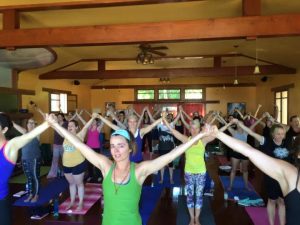The New Oxford American Dictionary defines home as “the place where one lives permanently, especially as a member of a family or household.” What if I disagreed with the Oxford University Press? What if I told you that home is something that you carry with you. Maybe you’ll roll your eyes and tell me to stop speaking in abstracts. Or maybe you, too, understand what it’s like to possess this internal shelter, built gradually as a result of the overabundance of physical homes.
I could you tell you about what I called at age three “the big blue house”—the only home that I knew for the first six years of my life. I could tell you about the Easter-lilac painted walls of my bedroom and my Barbie-themed wallpaper. I could tell you about the canopy bed that I received at age four, informally known as my fortress. I could tell you about the picture window in the living room where the sunlight flooded in at dusk upon the grey sofa. I’d curl up on that sofa for long naps and suck on the middle and index finger of my left hand—an infantile habit that I couldn’t seem to break. I could tell you how my almond-colored eyes lit up each afternoon when my father returned home from work. I would shriek “Daddy!” and eagerly leap into his broad arms, wrinkling the carefully ironed creases of his suit.
I could tell you what it’s like to lose everything when you’re too young to comprehend that loss. I could tell you what it was like to smell the lemon-scented disinfectant and listen to the vacuum do its final sweep of the living room, as the realtor impatiently waited in her ebony pencil skirt and overpriced stilettos for us to clear out the last of our things. I could tell you that at six years old, I kissed the speckled-black carpet before I exited the house for the final time. I could tell you how I stubbornly threw myself across that carpet and begged my mother to let us stay; the warm tears flowed generously down my face. I could tell you about the perfume that my mother wore that day, Estee Launder, and how that smell was the only familiar thing to me after we left the house.
I could tell you about the silent heartbreak in my mother’s expression as she carried me down the steps of the sapphire-blue porch on that humid July afternoon. This was same porch that was long enough for me to learn to ride my first bicycle on. But it was somehow shorter that day. Too short. I could tell you about the heaviness of the July air in that moment. Air too heavy to breathe in comfortably—I could have sworn we were ten times closer to the equator than I’d ever been. I could tell you that Matchbox Twenty’s “Long Day” blared through the speakers of our tawny minivan as it stalled down the paved driveway for the last time.
***
I could tell you about the apartment complex in Gloucester that we resided in for less than a year thereafter. I could tell you about the sea breeze that seemed like a permanent fixture of the residence. The air was not heavy, but salty. My mother would often bring my brother and me on walks down to the nearby pier because there was more to see there than there was within the cold, white walls of our apartment. I could tell you about the strangers that I’d occasionally see in the corridors of the building. I could tell you about the key card that we used to enter our room—equip with one and a half bathrooms and a kitchenette with black-and-white checkered floors. I could tell you that this residence was never technically my “permanent address.” My mother shuttled me thirty minutes to attend school and dance practices at “home.” I could tell you how at the tender age of seven, I knew to keep this place a secret; I understood that “living under the radar” meant that we might not lose everything all at once. I could tell you about the chlorine filled pool adjacent to our building and the metallic silver elevator that led us to our room. I could tell you what it’s like to spend a year in what was more a like a hotel than a home.
I could tell you what it’s like to move out-of-state when you’re old enough to understand that state lines are more than just signs on the highway. I could tell you what like to feel your stomach sink every time you passed the “welcome” sign in a state that I never felt less welcome in. I could tell you what it’s like to be eight years old and move to the state with the most suffocating motto of all—“live free or die.” I could tell you what it’s like to reside in one room with four people. Four twin beds lined up side-by-side in the guest room in my grandparents’ mobile home. I could tell you what it’s like to spend five years lying to your friends at school about why they can’t come over to “your house” to play because you were too ashamed to admit that your entire immediate family was literally living in one room.
***
I could tell you about various other impermanent residences. Some were houses; others were trailers—some with lawns large enough to mow; others with winding dirt driveways. I could tell you that collectively, the walls were always white, and the exteriors were never blue. I could tell you what it’s like to be better acquainted with the real-estate section of the newspaper at the age of eleven than people twice your age are. My small fingers would smudge against the blank ink with the hope that might be the last U-Haul truck we’d be forced to fill.
***
I could tell you about my most permanent of “permanent addresses” to date—permanent enough, even, for my diploma to be forwarded to. Although its crimson exterior is in desperate need for a new paint job, its interior is spacious enough to house (comfortably!) a family of six. I could tell you that my family has rented this space since I was in the sixth grade; making it the most “stable home” that I’ve had in all my life. I could tell you about the tattered photographs that hang on my bedroom walls. I could tell you about the turquoise Eclipse Blackout Energy-Efficient curtains that I finally purchased for my bedroom windows after living in that room for nine years, because it took that long to for me to understand that we might call this house a home. I could tell you about cherry-Nyquil I kept on my bedside table to combat my chronic insomnia. I could tell you about the laminated “about me” poster that still hangs on my wall. I could tell you that I made that poster in kindergarten and it somehow survived the various U-Haul expeditions. On this poster, we were instructed to write three wishes. In the loopy, oversized handwriting of a five-year-old, my first wish was simply “a new house.”
I could tell you about the creaky hardwood floors in the dining room that gives this place its quaint New England charm. I could tell you about this past Christmas morning when we ran out of heat in our house. I could tell you what it’s like to shiver beneath a fluffy Sherpa throw as you tear apart metallic wrapping paper. I could tell you what it’s like to smell the evergreen tree strung with white lights and adorned with homemade ornaments, with numbness stinging deep within your limbs.
***
I could tell you what happens when you don’t treat your body like internal shelter that it is. I could tell you that when you are in a state of extreme energy deficit, your body does everything it can to keep itself warm. I could tell you that you’ll develop a thin layer of hair allover; scientifically known as lanugo, this evolutionary function is the body’s desperate attempt to retain heat. I could tell you that it’s possible for quivering to become state of being—a sensation that ravages the mind and body without mercy.
I could tell you what it’s like to reside inside of a hospital. Is there any less of a “home” than that? I could tell you what it’s like to get weighed each morning at 8 A.M. in a baggy, foreign hospital gown. I could tell you that I forced to stand on the scale backwards, as though the neon green numbers were a secret that I was not yet old enough to know. I could tell you what it’s like to fear more than anything else in the world the thought of taking up space. I could tell you what it’s like to compromise your body’s natural ability to house another life—infertility. Medically termed amenorrhea, or menopause thirty years prematurely, is the female body’s way of saying “this place isn’t safe enough for another life.” Panic mode. I could tell you what it’s like to live in a world of whitespace, a sphere of numbers and insurance policies and starchy twin beds. I could tell you more, but each day in this residence was amnesiac. I could tell you what it feels like to hear a balding, middle-aged man associate you with the anorexia nervosa for the first time. Gritting his coffee-stained teeth, and awkwardly fidgeting with the metal frames of his glasses, the man carelessly handed me a tissue when the tears streamed uncontrollably down my face. Is there any less of a home than a voice inside of your head that desperately desires nothing more than to evaporate completely?
***
I could tell you what it’s like to expand your body and mind, simultaneously. I could tell you that school became my safe haven—moving to a place that fosters intellectual stimulation motivated me to repair my atrophied being. I could tell you about my current living space, how my purple yoga mat is a permanent fixture on my bedroom floor because I prefer to do my homework there while I drink my morning coffee. I could tell you what it’s like to make a twin bed that god-knows-how-many other people have slept on feel cozy. I could tell you what it’s like to decorate a dorm room far more than you’ve ever decorated any other space, despite its white walls. I could tell you about my wooden bed frame, my first bed frame since the canopy bed days. I could describe the glorious feeling of freely cranking the thermostat, courtesy of university housing. I could tell you about the “be free” and “healing is yours” posters that hang from my walls, because cliché as they are, they remind me of the home that I internally possess. I could tell you all about the beautiful views of the courtyard from my bedroom window. I could describe what it’s like to know that here and now is too precious, too ephemeral, too real to let go of.
***
I could tell you that I am currently sitting in the plush silence of quiet room inside the library, and I feel more at home in this moment than I have in the past twenty-two years. This wooden cubicle may not be my home, but at this very second, it is where I reside, comfortably. I could tell you that as organisms, the autonomic nervous system involuntarily regulates our most basic bodily functions without any conscious recognition of such functions.
I am not thinking about my breath. My pupils dilate in response to the setting sun that streams through the enormous glass windows. My stomach digests the cinnamon raisin bagel I hastily finished moments ago. My lungs exhale carbon dioxide. All the while, I’m not an active agent in any of it. I could tell you that bodies really do understand the concept of “home” more than we give them credit for.
I could tell you that I am my own permanent residence. Laugh as you may, but let science back me up on this. Tenth grade biology class educated me on the process of homeostasis—the body’s ability to constantly regulate its internal conditions in response to changes in its external environment. We shiver when we’re cold to stay warm. We sweat when we’re warm to cool down. Biology refers to this as thermoregulation. The faultless 98.6 degrees of health. So, we respond to environmental changes with internal stability? Straightforward enough. On the contrary, never have I known four walls with that capability.
Home, in accordance with Oxford, is a four-letter one-syllable word for shelter. That shelter, I assume, is associated with a physical location rather than a state of being. But does a dictionary definition outweigh human experience? Why not keep your home inside of you? Destinations are too faulty, too unstable, too cold, too confining to sustain life. Think homeostasis.
I could tell you that my home is the rivers of blood that pulse through my veins at any given instant. I could tell you that my home is the softness that covers parts of my body that were once starved angles. My home is in each stride that I take, in the rubber soles of my sneakers against the pavement during a run, in my appropriately elevated heart rate while I struggle for air. My home is the strands of my thick, unruly, auburn hair just after I get out of the shower, hair that finally grows again. My home is my regained fertility—my body’s subtle way of telling me that this place might make a satisfactory shelter, after all.


